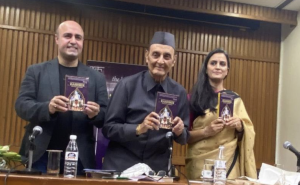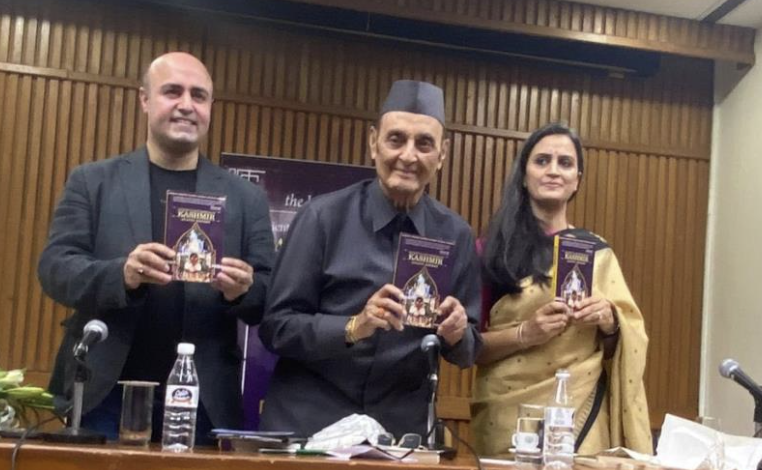NEW DELHI: According to Dr. Karan Singh, a distinguished academic, former Union Minister, and scion of the former State of Jammu and Kashmir, it will not be feasible for Kashmiri Pandits to return to their native land. “I’m frequently asked if Kashmiri Pandits are allowed to return to their homeland. Singh, a Shaivism expert, stated, “I believe it is impossible for Kashmiri Pandits to return to Kashmir, despite the efforts of many Governments to do so. “Successive Governments have constructed safe zones for them, but they are not able to go back to Kashmir,” Singh went on. Some people manage to return, but others are unable to do so.For the Kashmiri Pandits, the government has also planned numerous activities, but he continued, “I’m not sure how they can go right now. During the launch of Avanti Sopory’s book “Ancient & Lost Temples of Kashmir,” Karan Singh spoke these things. He claimed that Kashmiri Pandits were responsible for what he had learned in life. “I get all of my knowledge from Kashmiri Pandits, or vidya. I shall always be grateful to them. However, I find it heartbreaking to witness the struggles this intelligent, well-spoken, and educated community faces,” Singh remarked. He added that it is a reality that Kashmir has suffered numerous tragedies over the years, with the Pandit migration of 1989–1990 being the sixth such catastrophe in the history of the area.“Kashmir was known worldwide for Buddhism and then Hinduism, but everything that Kashmir stood for was destroyed by Afghans, Turks, and Mughals. Kashmir even hosted a significant Buddhist meeting in the past. Karan Singh stated, “Kashmiri Pandits were only allowed to return to their homeland during our era, which was the Dogras’ control over the Valley. He claimed that the Pandits of Kashmir are resilient and have never given up. “You, the Kashmiri Pandit, have an unwavering spirit. You leave your mark on the community wherever you go. You have a battling attitude and have never given up,” Singh exclaimed. He stated that, luckily, the rich Hindu heritage of Kashmir has not been thoroughly researched or documented. Great Hindu emperors ruled over Kashmir. Prominent Hindu poets, builders, philosophers, and a wealth of Hindu history from Kashmir, which has sadly not been well documented or presented,” Singh said. In a same vein, he claimed, Kashmir has also had Dogra kings, whose histories have likewise been misrepresented and inadequately documented. “The Dogra dynasty was responsible for expanding India’s borders to include China, Tibet, and Central Asia. The Marathas were unable to expand India’s borders, but we Dogras were able to do so. They engaged in combat inside India’s borders. However, none of this is adequately written about or given to the public,” Singh remarked. He made a point of pointing to Kashmir’s other well-known roads and hospitals, including the renowned Boulevard Road, saying, “All this was built by us.” He added that while Maharaja Gulab Singh and Zorawar Singh were only Sikh Empire foot soldiers, they were able to establish one of the most illustrious powers in Indian history by pure willpower and skill. In her book introduction, Sopory stated that we should inform the public about the fruitful conversations that have taken place in Kashmir over the previous two millennia concerning Buddhism, Sanskrit, science, and medicine.“We need to do it; if we don’t do it, then who will?” she uttered in Kashmiri. She brought to the attention of her audience the period when prominent individuals from China, Persia, and Central Asia would travel to Kashmir and establish the region as the centre of discussions in literature and science. Regarding the temples in Kashmir, Karan Singh stated that his family’s Dharma Trust has been doing everything within its power to maintain them operational in Kashmir. For example, many people are unaware of the existence of a temple maintained by the Army in the Pandraten region. In Kashmir, it has been operating smoothly for the past few years, according to Singh. Sopory noted that just three of Kashmir’s old temples remain intact: the Parvati (Sharika) temple in Srinagar’s Hari Parbat fort; the Kheer Bhawani in Ganderbal; and the Shankaracharya or Jyeshteshwara temple in Srinagar.


